https://www.artsy.net/article/artsy-editorial-10-best-booths-art-basel-2024
The 10 Best Booths at Art Basel 2024
Despite initial forecasts, there was no sign of rain at Messe Basel as the international art world gathered once again for Art Basel 2024’s VIP opening on Tuesday morning.
Following the First Choice breakfast, where many enjoyed their first glass of champagne of the day, crowds poured into the exhibition center as soon as the fair officially opened at 11 a.m. Mere minutes later, the typical jostling and bustling around booths—a fixture of the fair’s opening hours—was in full force. As with the packed, buzzy opening the evening before for Art Basel’s Unlimited sector, it was clear that the energy was high.
This year’s edition of Art Basel features 285 galleries from 40 countries and regions, including 22 first-timers. The preponderance of strong secondary-market works by established artists was perhaps the strongest theme throughout the fair, as was the inclusion of works by many artists currently featured in the 2024 Venice Biennale.
More than a few people at the fair noted that the positive change in the weather could be seen as a metaphor for the art market at large. Art Basel CEO Noah Horowitz was among them, acknowledging “a degree of caution” in the current market at a press conference on Tuesday afternoon, though he ultimately erred on the side of optimism: “Given the global audiences that have attended, the energy in the halls…the market is very much still here, and very strong,” he said.
Early sales would offer signs of credence to Horowitz’s observation. Within the opening hours of the fair, leading reported transactions included a $20 million Joan Mitchell painting at David Zwirner, a $16 million Arshile Gorky drawing at Hauser & Wirth, and a $6.75 million Julie Mehretu canvas at White Cube. (You can read our digest of Art Basel’s day one sales and stay tuned for our full sales report on Monday.)
If this fair can herald a sunnier spell during what has been a cloudy period for the art market is something that will be closely watched. The sheer quantity of quality work, the packed aisles of the Messe, and the rosy attitude among dealers on the fair’s VIP day might just mark a turning point in the forecast.
Here, we share the 10 standout booths from Art Basel 2024.
Pace Gallery
Galleries, Booth A7
With works by Alexander Calder, Adolph Gottlieb, Agnes Martin, Louise Nevelson, Richard Pousette-Dart, Sam Gilliam, Kiki Kogelnik, Pablo Picasso, Nathalie Du Pasquier, Torkwase Dyson, Robert Frank, Alicja Kwade, Sonia Gomes, Peter Hujar, Robert Indiana, Beatriz Milhazes, Lee Ufan, Yoo Younkguk, Jiro Takamatsu, Emily Kam Kngwarray, Gideon Appah, Yto Barrada, Nigel Cooke, Mary Corse, Matthew Day Jackson, Jules de Balincourt, Latifa Echakhch, Pam Evelyn, Adrien Ghenie, Robert Longo, Loie Hollowell, Nina Katchadourian, Kylie Manning, William Monk, Yoshitomo Nara, Robert Nava, Hermann Nitsch, Paulina Olowska, Trevor Paglen, Alejandro Piñeiro Bello, Michal Rovner, Joel Shapiro, Li Songsong, Mika Tajima, Lee Ufan, Hank Willis Thomas, and Qiu Xiaofei
With a laundry list of blue-chip artists on its books, Pace Gallery’s display wasn’t so much a fair booth but a tour de force of the mega gallery’s star-studded roster.
The gallery’s vast presentation—which was almost impossible to walk through during the fair’s VIP day—is anchored by one of the fair’s standout pieces: a snaking black-and-white painted Banc-Salon (1970/2024) bench by Jean Dubuffet. The work, presented in collaboration with Galerie Lelong & Co., is situated below two of the artist’s hovering cerfs-volants (kites), which invite visitors to sit, reflect, and also take a merciful breather from the surrounding Art Basel chaos. Three editions of the sprawling work sold for €800,000 ($859,160) apiece.
It’s one of a breathless series of standout works, such as Agnes Martin’s pale blue-and-red-striped Untitled #20 (1974) (which, when Artsy encountered it, had its own security guard), and phalanx of works by artists currently showing in Venice, such as Sônia Gomes, Peter Hujar, Beatriz Milhazes, Lee Ufan, and Yoo Youngkuk. Tucked around one corner is an exemplary Alexander Calder hanging mobile; around another is a vivid 1993 Robert Rauschenberg painting, Park Party (Urban Bourbon).
Sales reported by the gallery appeared to be commensurate with the booth’s attendance. “We expected a calmer start to the fair with slower decision-making but, by noon, all available editions of our Dubuffet were sold—along with over half the works in the stand,” said CEO Marc Glimcher. “It was exhilarating—and a little exhausting—as we saw the collectors coming back in full force after what has been a decidedly slow spring.”
In addition to the Dubuffets, the gallery’s reported sales from the VIP day included a painting by Hank Willis Thomas for $110,000 and a painting by Nigel Cooke for $330,000. Emerging artists from Pace’s program garnered sales, too, such as Pam Evelyn, whose work Inconstant (2024) sold to the Musee Hôtel de la Marine, for $75,000.
Argentine artist La Chola Poblete examines the implications of white supremacy and colonialism through a multifaceted practice that encompasses installation, sculpture, performance, and watercolor.
These themes are once again at the fore at Buenos Aires gallery Barro’s presentation in the fair’s Statements section, dedicated to solo presentations by emerging artists. A series of loosely figurative watercolors are smattered with religious and ancestral symbology, which touch on the artist’s roots in Mendoza and her queer identity.
At the center of the booth, the artist has constructed a wall installation melding an iron frame in the shape of a Christian altarpiece, flanked by two female figures whose heads are obscured by bread. The piece nods to exoticized depictions of Indigenous figures, while also showing arrows aimed toward the women, an allusion to the violence faced by Indigenous communities.
“It’s very important what she has to say to the world of being respectful of who you are,” said Valeria Peroraro, artistic director at the gallery, “and embracing different identities, different cultures.” The winner of the Deutsche Bank Artist of the Year prize in 2023 and with work featured at the 2024 Venice Biennale’s main exhibition, La Chola is a real name to watch. It’s no surprise that the gallery noted strong institutional interest at its booth within the first hours of the fair.
Sies + Höke
Galleries, Booth P18
With works by Peppi Bottrop, Julian Charrière, Talia Chetrit, Daniel Gustav Cramer, Justin de Verteuil, Marcel Dzama, Ulrich Erben, Andi Fischer, FORT, João Maria Gusmão, Hedda Roman, Federico Herrero, Paul Hutchinson, Lotte Maiwald, Jonathan Meese, Fabrice Samyn, Henning Strassburger, Michael van Ofen, Julius von Bismarck, Sophie von Hellermann, Claudia Wieser, Xie Lie, and Gerhard Richter
One of the most prominent stop-and-stare moments at this year’s Art Basel is a mechanical deer. Standing atop a wooden platform, the eerily realistic animal’s limbs are connected by a series of winches that collapse and detach at seemingly random moments, disfiguring the poor creature before reassembling in a snap second, much to the awe (and occasional fright) of viewers.
The work is an eye-catchingly smart commentary on “the deer as a monument versus the deer as a real animal,” as the artist Julius von Bismark put it to Artsy. Interrogating our often harmful relationship to nature through “the innocent wild, not the wild we are afraid of,” the work is a standout in the booth of Düsseldorf gallery Sies + Höke.
The gallery’s presentation offers more than the mechanical marvel. Its booth also includes a varied selection of abstract works by artists such as Jonathan Meese, Andi Fischer, and Peppi Botrop that are united by their connection to psychological and sociocultural explorations. Elsewhere, a special section of the booth, part of the Kabinett sector, is a mini exhibition of Gerhard Richter’s famous “Reflections” series—mirror works that lead the viewer to become an active participant in the image-making process.
Behind a translucent curtain and surrounded by mirrors, Omyo Cho’s glass sea snails were attracting plenty of visitor attention during the opening hours of VIP day at Korean gallery Wooson’s booth.
The presentation in the Statements sector features two works—priced at €20,000 ($21,610) apiece—made up of glass globules that are held up by wiry steel frames that appear almost threatening in their stance and and sentient in their shape. The works are based on a science fiction novel by the artist that imagines a future in which sea snails become the inheritors of the world after the extinction of the human race. The narrative was inspired by a series of real experiments in which biologists were able to extract memories from the mollusks.
This background gives the booth an creepy feel, elevated by the mirrors surrounding the works. “She wanted the audience to see themselves in the mirror, to see the future and the present at the same time,” said Wooson’s Johnny Choi.
Esther Schipper
Galleries, Booth R1
With works by Rosa Barba, Julius von Bismarck, Matti Braun, Sarah Buckner, Angela Bulloch, Etienne Chambaud, David Claerbout, Simon Fujiwara, Ryan Gander, Liam Gillick, Pierre Huyghe, Karolina Jabłońska, Ann Veronica Janssens, Annette Kelm, Tomasz Kręcicki, Gabriel Kuri, Prabhavathi Meppayil, Roman Ondak, and Philippe Parreno
Visitors arriving to the first floor of Art Basel via escalator can’t ignore the set of 15 gold leaf works by Ugo Rondinone that sit on the outer wall of Esther Schipper’s booth. The artist melds farm tools and other objects from daily life, such as skirting boards and pans, onto a panel, and coats them in gold leaf, elevating and displacing them from their everyday use to dazzling effect.
The wall provides a fitting entrance to a booth that is brimming with experimental excursions. A glass marquee flickering with lights by Philippe Parreno hangs above the center; a jellyfish-like optical fiber and silicon sculpture by Anicka Yi floats in its own dedicated alcove; and a giant pressed and dried palm tree by Julius von Bismarck hulks over one wall. The Berlin gallery’s curatorial vision—long commended for its conceptual focus and risk-taking program—is in full swing here.
The gallery is also hosting three solo presentations on the wall adjacent to its booth that will rotate throughout the fair. On the VIP day, the reins were handed over to Ryan Gander, who presents works from his “Phantom Ambition” series of exhibition posters. Gander envisions imaginary events from real institutions, such as a 2028 exhibition of Martin Kippenberger at the Leeum. Presentations by gallery artists Annette Kelm and David Claerbout will follow in the days to come.
It was clear across the course of the VIP day that the booth was a source of consistent engagement among visitors. “We have had so many compliments about our booth today,” noted senior director Tara K. Reddi.
The Breeder
Galleries, Booth R19
With works by Ekene Stanley Emecheta, Luke Edward Hall, Maria Hassabi, Maria Joannou, Lyn Liu, Philippe Malouin, Miltos Manetas, Georgia Sagri, Deborah Segun, Mamali Shafahi, Chrysanne Stathacos, Katlego Tlabela, and Jannis Varelas
Athens-based gallery The Breeder’s standout booth focuses on the “diversity of the artists’ work” from its roster, according to its director Nadia Gerazouni. The display here suggests that this tastemaking gallery is on something of a hot streak.
An immediate standout is the gold-soaked photo print Untitled (2024) by Maria Hassabi, the artist most prominently displayed at the booth, who also has a major work featured in the Unlimited sector. Hassabi’s work—which also appears on the cover of the Art Basel fair map this year—captures a figure who appears to be trapped between free-fall and defiance, her limbs blurring into the corners of the frame. It’s an exemplary work of the Cypriot artist and choreographer, who is known for her intense focus on the human body as a sculptural form, often soaked in broad strokes of warm colors. Other photographs extend this preoccupation, focusing on hands, standing poses, and other compositions. Prices for works by the artist in the booth range from $10,000 to $25,000.
Other works featured here include the painting Rejection - wisdom tooth (2023) by new gallery addition Lyn Liu, who presents teeth with strangely human qualities. The interior space of the booth is overtaken by a pair of large aluminum sculptures by Georgia Sagri—a red leg and a yellow ear that sit facing each other, anchoring the booth’s bodily themes.
Goodman Gallery
Galleries, Booth P11
With works by Ghada Amer, El Anatsui, Kudzanai Chiurai, Nolan Oswald Dennis, Leonardo Drew, Claire Gavronsky, Pélagie Gbaguidi, David Goldblatt, Nicholas Hlobo, Alfredo Jaar, Remy Jungerman, William Kentridge, Kapwani Kiwanga, Atta Kwami, Laura Lima, Misheck Masamvu, Shirin Neshat, Ravelle Pillay, Faith Ringgold, Zineb Sedira, Rose Shakinovsky, Yinka Shonibare, Pamela Phatsimo Sunstrum, Clive van den Berg, and Carrie Mae Weems
Marking 40 years at Art Basel, South Africa’s Goodman Gallery presents a comprehensive survey of works by the major artists on its roster alongside more emerging names that are quickly making a mark on the international art world.
A vast new El Anatsui tapestry sprawls across one wall of the booth and is foregrounded by Yinka Shonibare’s Refugee Astronaut VI (2024), taken from the same series of nomadic astronaut sculptures that is featured at the Venice Biennale. The booth also presents a wall-based ceramic-tiled work by Kapwani Kiwanga, who is representing Canada at the Venice Biennale; a pair of ambiguous monochromatic ink-and-paint forest scenes by William Kentridge set to feature in the artist’s upcoming opera at LUMA Arles in July; and photographs by Carrie Mae Weems, who has just concluded a retrospective at the nearby Kunstmuseum.
There’s also a trio of works by Faith Ringgold, including America Free Angela (1971), a paper cut-out originally made to protest the imprisonment of the American activist Angela Davis, and a diptych story quilt South African Love Story #2 (Part I and II) (1985–87), which was created during the struggle against apartheid.
Sales during the opening day were swift. Among the highlights of sales at the booth were the Shonibare work, priced at £250,000 ($381,500), and a 2024 Kentridge sculpture, which sold for $600,000. “We’ve met some of our most significant clients around the world,” said Jo Stella-Sawicka, senior director at the gallery. “This is a convening place, really the deepest part of the market.”
Bernard Jacobson Gallery
Galleries, Booth G15
With works by Georges Braque, Robert Dukes, Sam Francis, Helen Frankenthaler, Henri Matisse, Bruce McLean, Robert Motherwell, Frank Stella, William Tillyer, and Marc Vaux
For the esteemed London gallerist Bernard Jacobson, Georges Braque isn’t just one of the greatest painters of the 20th century, he is the greatest. “Step back, look, and think when viewing his works—I think he’s the greatest painter of the last century,” Jacobson told Artsy. Indeed, from the evidence of the nine works by the French artist displayed in one half of the gallery’s booth, he makes a compelling point.
Ranging from 1918 to 1962, the paintings here are fine examples of Braque’s multilayered, incisive, and strangely moving approach to still life and representation. Whether it’s a bunch of prunes or a basket of apples, the French artist’s sensitivity and originality still hold a unique power to arrest and excite. Seeing so many of the works together—quite the rarity—makes for a truly exceptional display.
The other side of the booth is entered via either side of a vast Robert Motherwell painting, The Mexican Window (1974), a part of the artist’s “Open” series that places rectangular shapes within dense swathes of color. Beyond it, works by the likes of Henri Matisse, Helen Frankenthaler, and William Tillyer complete a first-rate—and occasionally revelatory—historical parade.
Garth Greenan Gallery
Galleries, Booth E18
With works by Howardena Pindell, Fritz Scholder, Jaune Quick-to-See Smith, and Emmi Whitehorse
Garth Greenan Gallery’s debut in the main galleries section of Art Basel could hardly have come at a better time for the New York tastemaker. Described by Greenan as a “greatest hits” of the gallery’s program, the five presented artists here have each recently been the subject of growing interest.
Whether it’s with a mix of older and new works by Jaune Quick-to-See Smith—whose traveling retrospective has just concluded at the Seattle Art Museum—or a vast, effervescent 2024 painting by Emmi Whitehorse—whose work can currently be viewed in the Arsenale portion of the Venice Biennale—this booth represents something of a celebration of the gallery’s artists who are receiving the widespread recognition that they deserve.
The booth also features a 1977 painting by the late artist Fritz Scholder, whose estate the gallery has just started representing. The work, which depicts a figure on horseback in a tense shade of purple, is typical of the artist’s realistic representations of Native Americans. Scholder will be the subject of a show at the gallery later this year. Works at the booth are priced from $250,000 to $875,000, and the gallery reported strong interest throughout the VIP day.
OMR
Galleries, Booth L16
With works by Matti Braun, Pia Camil, Julian Charrière, Claudia Comte, Jose Dávila, Pablo Dávila, Yann Gerstberger, Alicja Kwade, Artur Lescher, Jorge Méndez Blake, Gabriel Rico, Sebastian Silva, SUPERFLEX, Troika, and Tony Matelli
This year’s Art Basel marks the 23rd time that Mexico City stalwart OMR has participated in the fair. Its booth is an attestation of the gallery’s ambassadorial-like position in the Mexican art world.
“We’re trying to be a platform for showing international artists in Mexico and Mexican artists abroad, creating a dialogue between them,” said Kersten Erdmann, a partner at the gallery.
In addition to featuring a host of works by the gallery’s established artists, such as Jose Dávila and Jorge Méndez Blake, OMR also presents newer artists from its program, such as Alicja Kwade and Julian Charrière.
“We do have our program of Mexican artists, but in terms of international artists, all are very keen to come to Mexico and spend time there, which is something we’re encouraging them to do,” said Erdmann. A volcanic lava stone sculpture by Charrière, for example, incorporates Mexican obsidian that gives it an extraterrestrial quality. It’s part of a focus on found materials that runs through the booth—illustrated by Claudia Comte’s geometric paintings that use soil as pigment, and Pia Camil’s abstracted hanging tapestries constructed from stitched-together repurposed fabric that has been discarded by textile factories.
These works are also part of another strand that runs through the gallery’s booth: the relationship to the natural word, which is represented by other works such as Tony Matelli’s Weeds (2024), painted bronze sculptures that sit around the floor of the booth like plants growing through the walls. Taken together, the booth is a fine representation of the gallery’s influential position in today’s art world. Works in the booth range in price from $5,400 to $200,000.
Correction: A previous version of this article incorrectly stated that the El Anatsui work featured in Goodman Gallery’s booth was the only primary-market work by the artist at Art Basel 2024. That description has been removed.

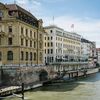
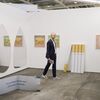
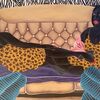
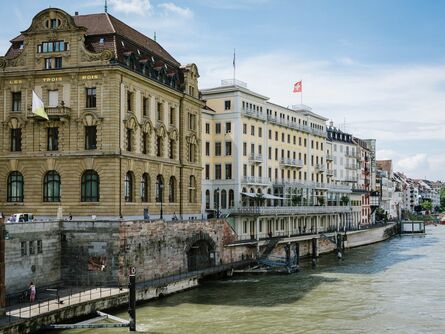
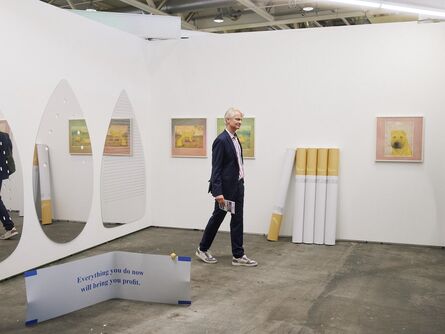
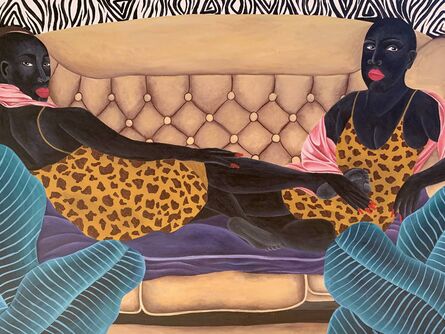
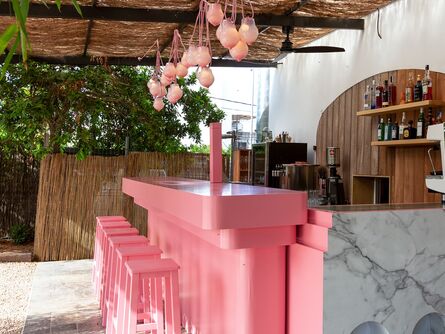
https://www.artsy.net/article/artsy-editorial-10-best-booths-art-basel-2024
ReplyDeletehttps://www.artsy.net/article/artsy-editorial-guide-art-basel-2024-experts
ReplyDelete